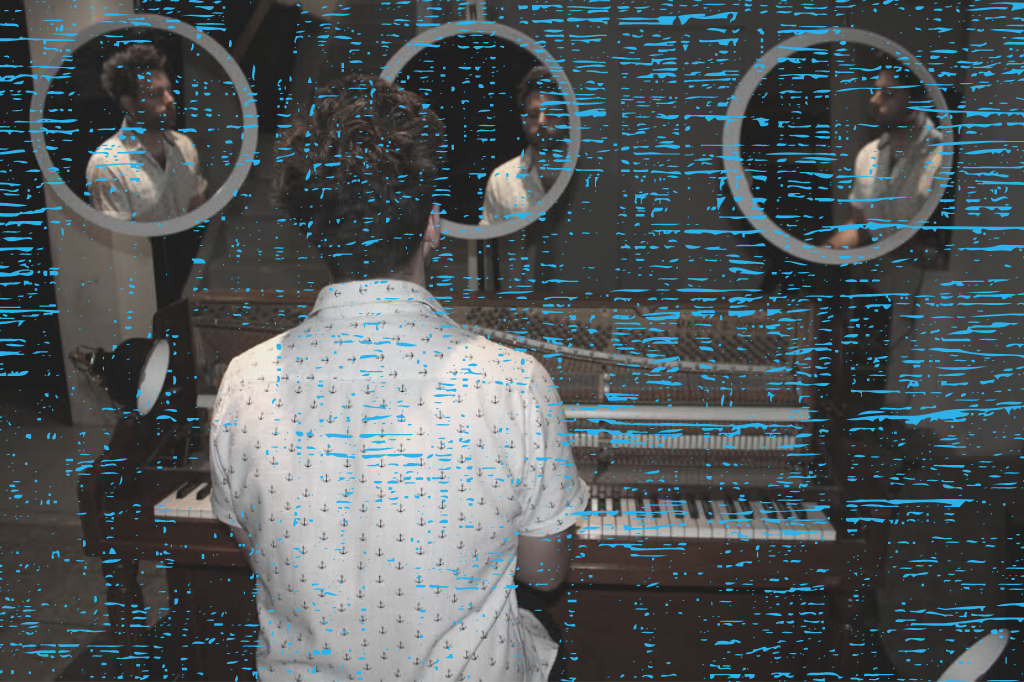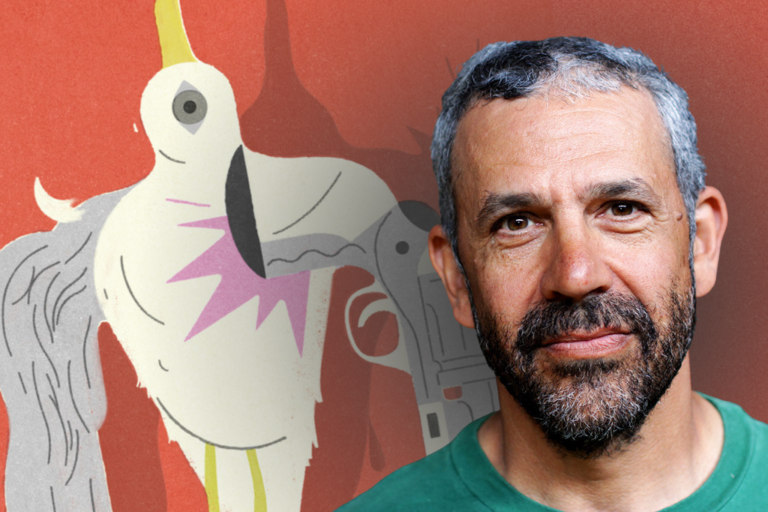‘Grappling with Permanence’: In Conversation with Lessons in Temperament
I’m a pianist: not quite self-taught, and not quite dad-taught, but the out-of-tune upright in my parents’ home has always been my place of solace. Today, its muddy tuning (seriously, several of its octaves have atrophied into sour minor sevenths over the years) haunts me: I miss it from here in Canada, after nearly two years away from having had the chance to play it.
The piano echoes in my head.
And again.
I crank open Zoom to the day’s interview: Outside the March’s Mitchell Cushman and playwright and performer James Smith are here today to talk to me about their upcoming project, Lessons in Temperament, a not-musical that hinges upon the presence and power of a live piano. In the piece’s in-person iteration, Smith weaves personal stories of mental ill/wellness with the piano-tuning concept of equal temperament, bringing an onstage piano into tune in real time as the show progresses.
Outside the March, under the direction of Cushman, however, has spent the past several months adapting Smith’s smash solo show into a film, recorded in empty theatres around Ontario over the course of the pandemic.
“The show, and now the movie, is largely about mental health, about James and his three brothers, who have all had different experiences across the neurodiversity spectrum,” says Cushman. “One of the reasons we wanted to make it into a movie during COVID is a real awareness that the pandemic has been a catalyst for many things, including increased mental health crises due to being more isolated, especially in the theatre community, where those opportunities to share stores in person have been much fewer and far between.”
“We thought an interesting backdrop to film the show in would be to go into empty theatres,” continues Cushman. “The piece is filmed in a dozen different shuttered theatre spaces during COVID, which we shot from November 2020 to March 2021. Those proved to be quite a provocative backdrop — those images of the empty theatres.”
Empty theatres proved to be quite a provocative backdrop.
I learn something new in the interview: a piano goes out of tune regardless if anyone actually plays it, shares Cushman, as Smith nods emphatically.
“I’ve learned a lot about piano tuning by hanging out with James!,” jokes Cushman. “The conceit of the film is that James has been hired to go into these different theatres and keep their pianos in tune during the pandemic.”
I’m blown away, and I tell the artists as much. I turn to Smith, now, asking about the genealogy of Lessons in Temperament — the complications which have surely accompanied the migration from stage to screen.
“It’s still rooted in the theatre, given that it’s in theatres,” says Smith, laughing. “It’s very much alive, but it’s different — it’s these empty theatres. My audience as a performer in those moments captured on film are our cinematographer, and Mitchell, and our designer, and the gaffer.”
“As an actor without a lot of film experience, I really needed to turn the crew into my live audience,” continues Smith.
There’s a shared reverence for liveness in this Zoom call: it’s clear in how Smith and Cushman discuss Lessons in Temperament.
“The play puts art, puts performances, into these spaces that otherwise are empty. It felt really good for us; it was therapeutic, as a group of theatre artists,” says Smith.
“We had a few straight-up film people on the team, but the original group of us was just theatre people trying to make a movie,” he continues.
“It really is a hybrid of theatre and film,” agrees Cushman. “Lots of learning one another’s languages. At one point I was trying to explain stage left and stage right to one of the film people, and then realized that I got it backwards, which was funny.”
It really did feel like an absent audience was present.
“This is a pretentious thing to say,” he goes on (and I interject: “be pretentious!,” excited for what’s coming). “I really did feel like an absent audience was present. And that carried a lot of information about what we were shooting. Something I’ve always loved about James’ live show is that he really is tuning a piano in real time in front of the audience, so over the course of ninety minutes, this Beethoven sonata that initially sounds like shit — super out of tune — sounds beautiful by the end.”
“We’ve maintained that structure in the film, but it’s not just one piano, it’s a dozen pianos.”
I ask how James feels in anticipation of the premiere — surely, I muse, it’s rather different from previous iterations of Lessons in Temperament, which, prior to the pandemic, were performed in cozy living rooms rather than empty theatres.
“Right now it’s just abstract — I haven’t been to a screening, I don’t know. When I’m performing a show, I live the whole experience of the show in ninety minutes, and then talk to the audience after. I don’t know what it’ll be like to just watch it, and be able to sit back. Maybe relief? I’m not sure,” considers Smith.
“I’ve watched as little of the movie as I’ve been allowed.”
Laughter from both: it seems we’ve stumbled into an inside joke, a world in which Smith has witnessed his own work “only at gunpoint,” giggles Cushman.
“I haven’t actually experienced the whole movie yet,” laughs Smith.
“It’s beautiful and strange, the permanence of it,” adds Cushman, poignantly. “Every time we chose a take, we had to be, like, ‘okay, that’s the way it is forever.’ We’ve really been grappling with permanence in relation to it.”
We’ve really been grappling with permanence in relation to making this film.
Grappling with permanence: the words bounce around my head, spinning, glowing. The interview has flown by with the effortlessly charming pair of artists on my screen — I’m a little bummed to say goodbye and stop my tape recorder.
The out-of-tune piano from back home keeps echoing in my head: I suspect it will long after today’s interview.
You can find out more about Lessons in Temperament and its upcoming screenings (both in-person and virtual!) here.















Comments